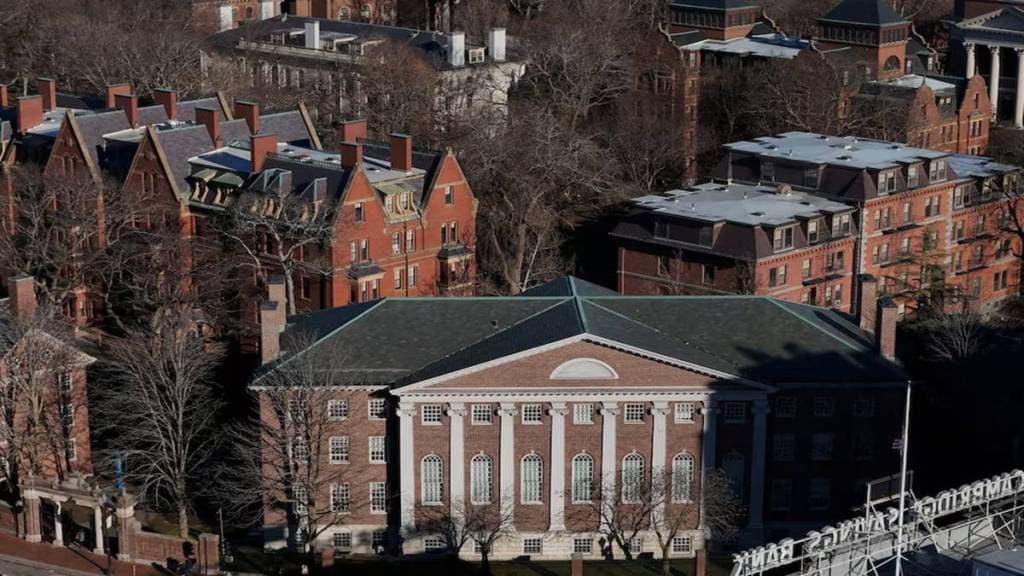Russian Harvard scientist Kseniia Petrova was legally in the United States on a J-1 visa sponsored by the Ivy League. The biomedical researcher at the prestigious higher-education institution was detained at a US Immigration and Customs Enforcement facility in Louisiana, as per The Harvard Crimson. Her research visa was revoked prior to the detention after she failed to properly declare frog embryos she was transporting to her lab in Massachusetts.
In a distressing update for the 30-year-old researcher, ICE continues to her deny her release, now declaring her a “danger to the community” in the wake of the customs error. Customs and Border Protection held her back after she didn’t declare her research material at Boston Logan International Airport. She was returning from a France trip on February 16.
ICE detention facility conditions
As a result, the Russian citizen’s attorney has come forward, briefly shedding light on the conditions the US immigration detention system has subject her to. Lawyer Greg Romanovsky said that multiple requests to get her released on parole have been blocked by the US authorities. “Kseniia is holding up remarkably well, especially given the freezing temperatures and otherwise difficult conditions at the detention facility,” he told the Daily Mail.
He also noted that ICE has declared the Russian Harvard researcher a “danger to the community” and a “flight risk” without offering sufficient evidence to back claims that she is a threat to the country.
17 US senators have since signed a letter, addressed to Secretary of Homeland Security Kristi Noem and ICE’s Acting Director Todd Lyons, urging for Petrova’s release. “Absent evidence that Petrova is a flight risk or a danger to the community, we strongly urge you to reconsider ICE’s recent decision not to grant Petrova parole and exercise discretion within your authority to release her from detention while her asylum case is pending,” it reads.
Russian Harvard scientist’s lawyer says CBP is unlawfully pushing for her quick deportation
The Harvard scientist previously filed two petitions through her attorney to facilitate her release from the detention facility. Therein, Romanovsky argued that the the Customs and Border Protection did not have the authority to cancel her research visa after her failure to declare frog embryos — a customs violation which can result in a $500 fine and the object being seized.
In a previous interview, Petrova’s lawyer said, “They definitely overstepped their authority by punishing Kseniia through the immigration penalties, as opposed to what they were supposed to do.”
The habeas corpus petition filed on February 23 contended that the CBP had unlawfully followed the “expedited removal” process to push for the noncitizen’s quick deportation without a full hearing in front of an immigration judge. “There was no cause for CBP to instead follow an entirely different process, that of expedited removal,” it stated.
The Harvard researcher’s lawyer acknowledged that challenging this removal order wasn’t easy, especially since the CBP has “so much discretion in the law.” A hearing for this petition is scheduled for June 9. Petrova’s attorney is trying his best to move it to an earlier date.
Although Kseniia Petrova’s ICE arrest has been attributed to a customs violation, it comes amid President Donald Trump’s immigration crackdown which has recently significantly targetted international students associated with campus activism or pro-Palestine protests.
Kseniia Petrova was also arrested in Moscow over political activism
The Harvard scientist was also arrested in Moscow in 2022 for protesting Russia’s invasion of Ukraine. She later fled the country and faces arrest if returned there. Consequently, her lawyer filed an asylum petition stating Petrova has a “well-founded fear of future persecution” in case of US deportation. “She cannot return to Russia without being jailed or harmed,” he said in the petition, adding that going back would “a suicide” for her.
The US senators’ letter also addressed the issue, contending, “Moreover, we are deeply concerned about the possibility that Petrova could face persecution if deported to Russia. We urge the Administration to ensure full due process in her case and take all appropriate and necessary measures to ensure she is not deported to Russia.”
Massachusetts Senator Edward J Market also highlighted Petrova’s plight on X, writing, “I’m urging DHS to release Kseniia Petrova, a dedicated Harvard Medical School researcher, while she awaits her asylum hearings. She faces prolonged detention after the Trump admin revoked her visa. Kseniia should be in Massachusetts – not 1,500 miles away in a cell in Louisiana.”
Alas, all such pleas have fallen on deaf ears as the Harvard Medical School researcher continues to remain in ICE custody. Right after being detained by CBP, Petrova was moved to a correctional facility in Chittenden, Vermont. Shortly after that, she was transferred to the ICE detention facility in Louisiana, where she is still being held.
Russian Harvard researcher’s visa status
According to the Daily Mail, the Harvard researcher was in the US on J-1 visa. “The J-1 classification (exchange visitors) is authorized for those who intend to participate in an approved program for the purpose of teaching, instructing or lecturing, studying, observing, conducting research, consulting, demonstrating special skills, receiving training, or to receive graduate medical education or training,” according to the US Citizenship and Immigration Services. “J-1 nonimmigrants are therefore sponsored by an exchange program that is designated as such by the U.S. Department of State.”
Meanwhile, The Harvard Crimson noted that she currently holds a Schengen visa, allowing “her to stay in countries in the European Union’s Schengen area for up to 90 days within a 180-day period.”


